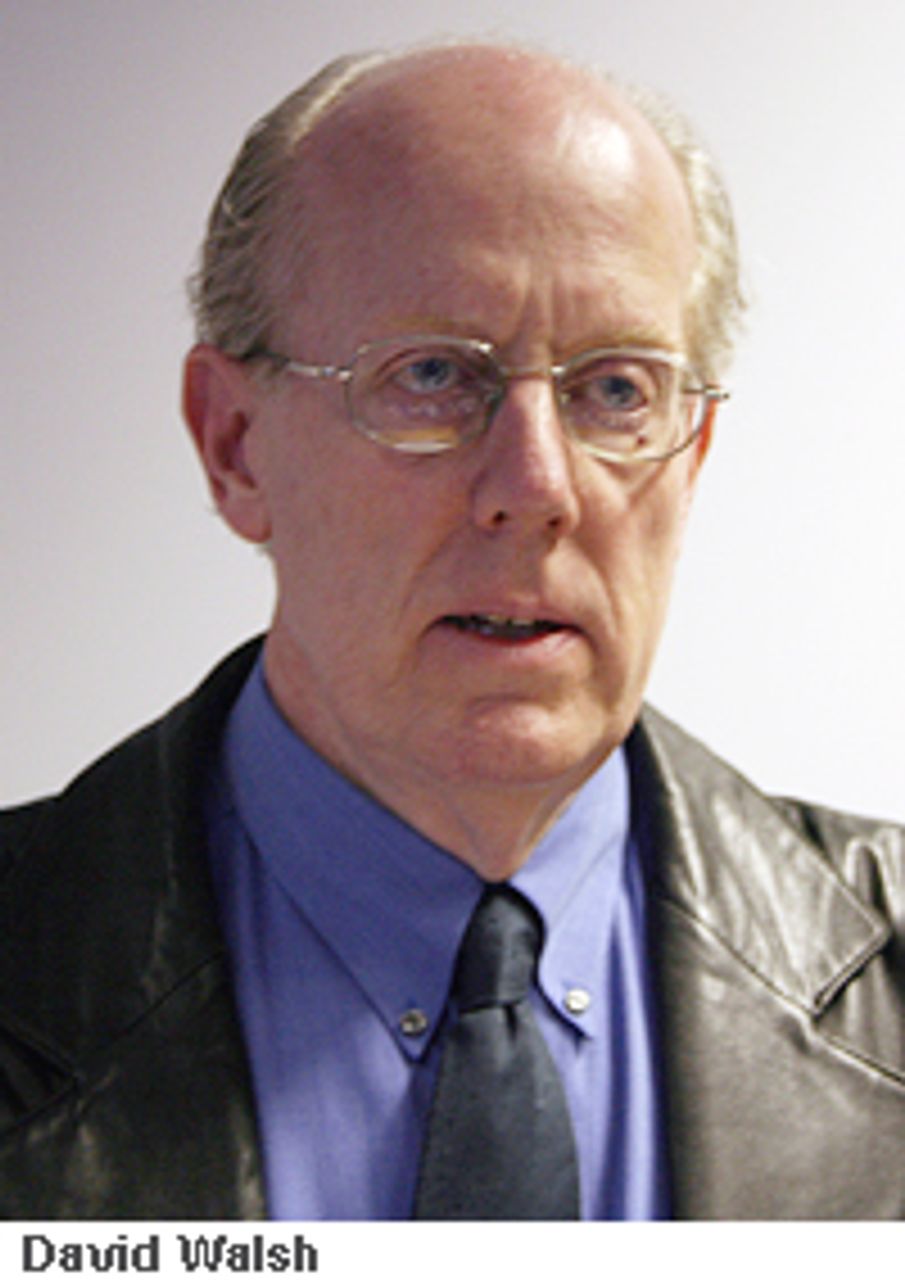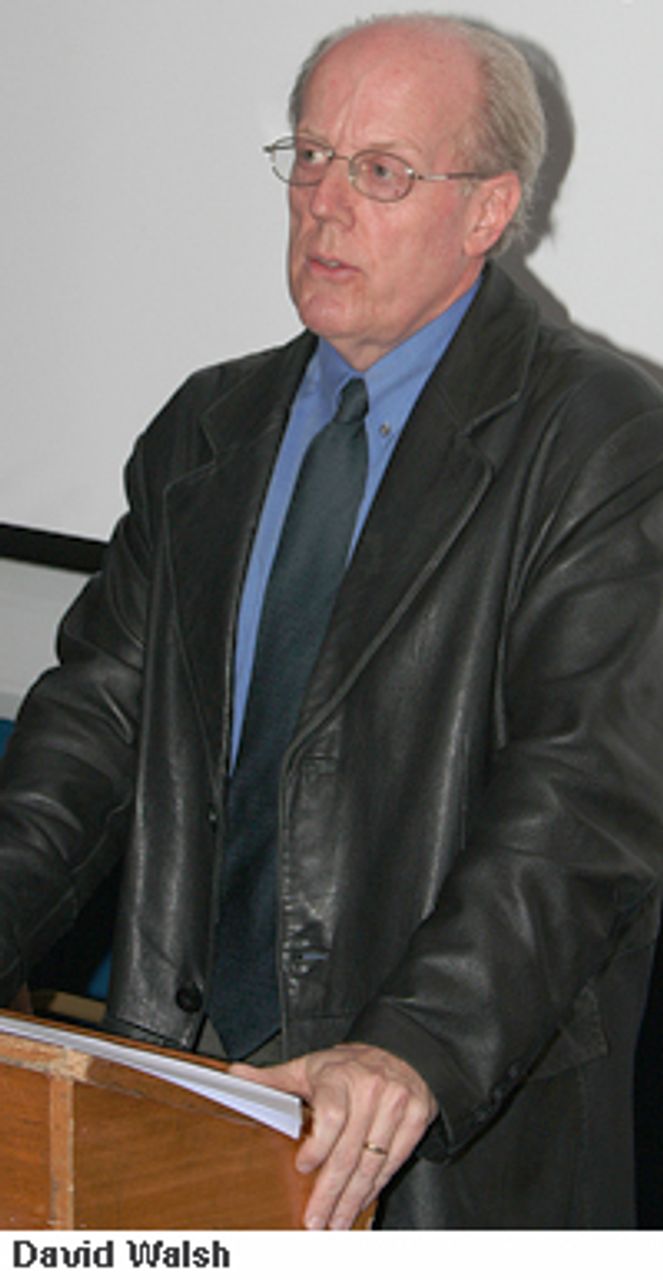David Walsh, arts editor of the World Socialist Web Site, is completing a series of meetings on “Art and Socialism” today, speaking at the London School of Economics. Meetings have also been held in Glasgow and Sheffield.

A transcript of Walsh’s lecture will be published shortly, as well as video clips. Here it is only necessary to explain that he focused on outlining the classical Marxist approach to art—as a means of cognising the world, rather than avoiding and retreating from it. He insisted that art, though based on subjective impressions, must seek, by its own methods and not those of science, to comprehend reality, to strive for a representation of objective truth—and in this way to discover within the particular expression something universal.
Walsh said that it would have been possible to entitle his presentation “the force of the objective.” He insisted that great shifts in the objective situation, as reflected in the US presidential elections and the plunge of world capitalism into crisis, would have a profound impact on art and the artist. But this would not be merely an objective development. The artist must seek to orient himself or herself to these developments, to develop a historic and indeed politically informed approach to society—that is essential in sensitising oneself to and being able to represent more fully the experiences of humanity. That is why the development of a mass socialist workers’ movement is so vital to the development of art and of the artist.
In turn, an appreciation of art and artistic creation, which has this extraordinary ability to depict the human condition, is essential to the development of a truly socialist workers’ movement. From this standpoint, Walsh dealt with the fundamental themes of post-modernism, structuralism and the Frankfurt school, which are often falsely identified with Marxism, concentrating in particular on Herbert Marcuse.
The lectures in Glasgow and Sheffield were well attended and the discussion was lively, with many questions posed and answered. 
In Glasgow, Walsh was asked whether the radical artists of the 1960s and early 1970s were influenced by Marcuse, and whether artists of that generation were connected to a previous Marxist culture.
Walsh explained that Marcuse had an enormous influence in the New Left and amongst German students. “As a result of the crimes of the Stalinists, artists were cut off from past generations and their achievements,” he said.
“As someone who participated in the movements of the 1960s, I would say there was a great deal of ignorance—what to make of the Russian Revolution, the Chinese Revolution? A great deal of the radicalism had a false and artificial character. You had people jumping around saying that all bourgeois image-making had to be destroyed; you had to go back to square one, to reconstruct the image. All this talk was pretty hollow. There were political and ideological problems that they were trying to circumvent with some artistic technique.”
Walsh returned to this point when asked in Sheffield to define what he saw as serious art—that succeeded in portraying something universal—and when asked whether there were contemporary artists, musicians or filmmakers who were of this calibre.
He said that there were important works being produced and often flashes of inspiration, but this was often not sustained. This was not primarily the fault of the artist, but the product of a decline in the type of cultural and political life that would help to sustain and inspire great art.
“In the twentieth century you can put a date on the year of the ‘continental divide’ in which terrible difficulties have beset art and the artist,” he said. “It was 1937, when so many intellectuals and artists were murdered in the Soviet Union and the socialist movement and the international working class had suffered such terrible defeats.”
An audience member in Glasgow pointed out that John Lennon was a respected and loved artistic figure who made a certain attempt to understand the situation.
Walsh posed the question, “Why aren’t there similar figures today? The corruption and enrichment has an impact, the celebrification of popular culture, the fragmentation of popular culture, the enrichment of celebrities and personalities is part of it. On the other hand, there is an ideological bombardment. There is reaction, ignorance, a cultural dumbing-down, that says you don’t need to think about these questions: the worship of the market, the worship of individualism, the worship of putting your foot on the other guy’s neck before he can put his foot on yours, this is the atmosphere in which people have lived.
“We have made the point that the last significant workers’ struggle in the US that was a victory was in 1977. To remember a time when the working class beat back the employers, you have to be 40-45 years old. John Lennon grew up in different circumstances. His parents and family had gone through depression, war, the rejection of the Tories at the end of World War II and the massive vote for Labour, which had a certain revolutionary content to it.”
Walsh insisted, “There will be no shortage of struggles to which people can orient today.”
“But,” he continued, “you have to have something in your head and something in your heart to do something as an artist. You can’t invent life experience, but have to be oriented towards them.”
Later, Walsh explained that Marcuse did not see any social force that could make a revolution. “If you hate this society when you look around you, but you don’t see any vehicle to get you to another one, and you have rejected the working class—you think that’s over, they’re not going to do anything, a socialist movement based on them is hopeless—then what do you do except fantasise?”
Walsh insisted, “Things would be so different if there was a broad-based social movement in opposition to the existing order from which they could get sustenance and feedback. It’s not the artists’ fault. There has to be a change in social circumstances. Things are going to break up. The stagnant and reactionary period we have been living through is going to break up. This economic crisis is going to break all sorts of things wide open, and then the artists will face a different situation. There will be an audience for all sorts of new thoughts.
“The problems of socialism and revolutionary leadership are essential. Art can’t save itself.”
In answer to a question comparing the influence of bourgeois art on society with “working class art,” Walsh explained that the bourgeoisie “as a merchant class, as a new powerful class, emerged over centuries within feudalism as a rich, educated and privileged class. It had institutions, universities, artists, all before the bourgeoisie talked about seizing power.… The working class comes to social revolution in a very different fashion. The working class is an oppressed class, cut off from culture. In a sense, it makes a revolution to have access to culture. There are no working class universities. There are no working class artists who remain working class artists. There is no working class culture. The job of the socialist revolution is to put an end to all classes, to create a classless society. We do not anticipate a long period of proletarian culture. It won’t exist. The job of the proletariat that takes power is to abolish classes and create a new culture, a classless culture, which is a very different prospect.
“There is no proletarian culture, there is no working class culture. There are socialist artists, there are revolutionary artists, there are artists in opposition, they remain members of the middle class. It’s not their fault. That is the way it is. It won’t be different until the whole of society is transformed.”
One academic explained the great difficulties he faced in encouraging a critical and Marxist approach amongst his students due to the commercial ethos that dominates in the universities.
Walsh said that this was certainly a situation in which things will begin to change and opposition will develop. “You will find at some stage that there are perhaps 50 people who feel the same as you. The influence of those I have spoken about has played a definite role. In the United States, the phrase that is used in universities is ‘Race, class, gender.’ That is the agenda of the universities in the US. There is a whole emphasis on gender and identity, etc.
“I think from what you have said that you will be among those who will play a role in opposition to what is happening. In the next period, a lot of people who wrote off socialism and the working class are going to be very surprised. But the fact remains that there must be a fight to change things. You have to take a stand.”
Fill out the form to be contacted by someone from the WSWS in your area about getting involved.
